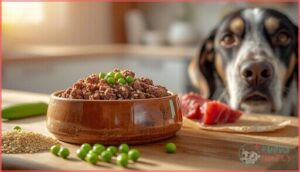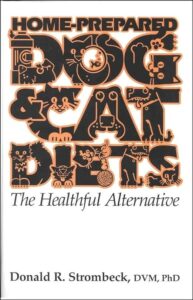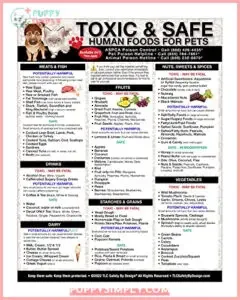This site is supported by our readers. We may earn a commission, at no cost to you, if you purchase through links.

Your German Shorthaired Pointer scratches constantly despite regular baths, lacks the energetic spark the breed’s famous for, or struggles with mysterious digestive issues—commercial kibble formulas often fall short for these athletic, sensitive dogs.
Research from veterinary nutritionists shows that GSPs require 25-30% more bioavailable protein than sedentary breeds, yet most commercial foods prioritize shelf stability over nutrient density, cooking ingredients at temperatures that denature essential amino acids and omega-3 fatty acids.
Preparing homemade food gives you direct control over ingredient quality, allows customization for your dog’s specific activity level and sensitivities, and generally costs 30-40% less than premium commercial options. The recipes and nutritional guidelines that follow provide evidence-based formulations to meet your GSP’s demanding metabolic needs.
Table Of Contents
Key Takeaways
- German Shorthaired Pointers require 25-30% more bioavailable protein than sedentary breeds, with homemade diets providing direct control over ingredient quality while costing 30-40% less than premium commercial options.
- Proper homemade GSP nutrition demands 20-30% of calories from complete protein sources, 10-15% from quality fats (balancing omega-3 and omega-6), and precise calcium-to-phosphorus ratios of 1.2:1 that meat-heavy recipes naturally lack without supplementation.
- Safe preparation requires cooking proteins to 165°F internal temperature, avoiding toxic foods like chocolate, onions, garlic, grapes, and xylitol, while storing refrigerated meals for only 3-5 days maximum to prevent bacterial contamination.
- Most adult GSPs thrive on two meals daily at 2-3% of body weight, but puppies need higher protein and caloric density with different calcium ratios, making adult recipes unsafe without veterinary-guided adjustments.
Benefits of Homemade Food for GSPs
Making your own GSP food puts you in the driver’s seat of your dog’s nutrition, giving you control that commercial kibble can’t match. You’ll know exactly what’s going into every meal, from the protein source to the last vegetable, which matters when you’re fueling an athlete like a German Shorthaired Pointer.
You can even explore a raw dog food diet for German Shorthaired Pointers to maximize digestive health and energy naturally.
Here’s what homemade feeding can do for your high-energy hunting companion.
Many owners find that Vizsla-specific homemade dog food recipes help maintain their dog’s lean muscle and stamina throughout long hunting days.
Improved Skin, Coat, and Energy
When you take control of what goes into your GSP’s bowl, you’re not just feeding them—you’re fueling a transformation that shows up in every glossy hair, every burst of stamina, and every ounce of vitality they radiate. Fresh homemade dog food delivers nutrient balance that commercial kibble often can’t match, supporting skin health and coat shine through bioavailable omega-3s, antioxidants, and amino acids your German Shorthaired Pointer actually absorbs.
If you’re exploring homemade recipes for Golden Retrievers, many of those same nutrient-rich principles apply beautifully to your GSP’s dietary needs.
Homemade food fuels your GSP’s transformation—glossy coat, boundless stamina, and vitality that commercial kibble can’t match
Here’s what proper canine health looks like:
- Energy boost that outlasts workouts
- Healthy glow from the inside out
- Reduced shedding, fewer hot spots
- Improved digestion, smaller stools
- Stronger immune response during stress
Healthy eating isn’t complicated—it’s intentional.
Ingredient Quality Control
You’ll never wonder what fillers, dyes, or mystery “by-products” are hiding in your GSP’s diet when you’re the one sourcing every ingredient that hits the cutting board. Food safety becomes your responsibility, not a gamble on label claims, while meal planning lets you trace each carrot, turkey breast, and salmon fillet back to trusted suppliers.
Quality assurance shifts from blind faith to hands-on verification—you control nutrient balance, freshness, and German Shorthaired Pointer-specific canine health through intentional ingredient sourcing and healthy eating standards that commercial dog food rarely achieves.
Cost-Effectiveness and Customization
Budget planning meets nutrient optimization once you realize that rotating affordable protein sources—chicken thighs, beef chuck, frozen salmon—keeps weekly costs stable while delivering bioavailable amino acids your German Shorthaired Pointer needs.
Meal customization unlocks financial benefits and Dog Nutrition precision through:
- Custom macronutrient ratios matching activity level
- Allergy-friendly ingredient swaps
- Seasonal produce reducing grocery bills
- Bulk grain purchases extending homemade dog food recipes
Cost savings compound when you’re engineering Dog Care and Nutrition, not overpaying for kibble fillers.
Portion Control for Weight Management
Controlling how much you feed matters just as much as what you feed, since even premium homemade meals can pack on pounds if portions exceed your German Shorthaired Pointer’s energy expenditure.
Daily feeding volume—calculated at 1.5–2.5% of body weight—gives you precision over caloric intake, while weekly body scoring catches weight drift before it becomes obesity.
Meal frequency adjustments and weight monitoring turn portion control into your most effective dog nutrition tool.
Nutritional Needs of German Shorthaired Pointers
Your German Shorthaired Pointer isn’t built like a couch potato—this breed burns through calories like a furnace, demanding precise nutritional balance to fuel those endless hours of running, hunting, and play.
Getting the macros right means understanding how protein, fats, carbs, vitamins, and minerals work together to support lean muscle, joint health, and that signature high-octane energy.
That’s why choosing the best dog food for German Shorthaired Pointers starts with formulas that deliver complete, balanced nutrition tailored to their active lifestyle.
Let’s break down exactly what your GSP needs in each category to thrive on a homemade diet.
Protein Requirements for Active Dogs
German Shorthaired Pointers burn through protein like high-performance engines burn fuel—and without adequate intake, their muscles, immune function, and boundless energy reserves simply can’t keep pace with their active lifestyle.
You’ll want to aim for 20–30% of total calories from complete protein sources—think lean chicken, turkey, beef, or fish—to deliver the essential amino acids that drive muscle growth, repair, and sustained performance in your pointer’s demanding routine.
Essential Fats and Fatty Acids
Fats aren’t the enemy—they’re the foundation of your German Shorthaired Pointer’s glossy coat, supple skin, and the cellular machinery that keeps inflammation in check and joints moving smoothly. You need 10–15% of calories from quality fats to support canine lipid metabolism, fat-soluble vitamins (A, D, E, K), and ideal fatty acid balance.
- Omega-3 sources: salmon, sardines, flaxseed oil
- Healthy skin fats: chicken fat, beef tallow
- Essential ratio: balance omega-6 and omega-3 for anti-inflammatory benefits
- Homemade dog food tip: add fish oil for concentrated EPA and DHA
Key Vitamins and Minerals
Your pointer’s vitamin balance starts with fat-solubles—A, D, E, and K—that support vision, bone mineralization, and oxidative defense against hard work. B-complex vitamins power metabolism, while trace elements—zinc, selenium, iron—fuel immune strength and oxygen delivery for canine nutrition that matches your dog’s drive.
Calcium needs demand a 1.2:1 ratio with phosphorus; meat-heavy homemade dog food runs low, so mineral supplements become non-negotiable.
A well-planned diet requires understanding nutritional needs to ensure peak health.
Carbohydrates for Sustained Energy
Complex carbs like oats, rice, and sweet potatoes deliver the glucose your German Shorthaired Pointer burns through during long runs, replenishing glycogen storage in muscles built for endurance.
Fiber benefits digestion while slowing starch digestion, preventing insulin spikes that derail energy for active dogs.
Homemade dog food should balance these energy sources at 30–50% of calories for sustained dog nutrition and health.
Safe Ingredients and Foods to Avoid
You have total control over what goes into your German Shorthaired Pointer’s bowl, but that freedom comes with real responsibility. Some ingredients fuel their boundless energy and support long-term health, while others can trigger anything from mild stomach upset to life-threatening toxicity.
Let’s break down exactly which foods belong in your homemade recipes, which ones you must avoid at all costs, and how to prepare meals that keep your GSP thriving.
Best Protein, Veggies, and Grains
You’re not just tossing food in a bowl—you’re building a foundation for your German Shorthaired Pointer’s vitality. When planning homemade dog food recipes, protein sources like lean chicken, turkey, and salmon should anchor meals at 20–30 percent of calories, while cooked carrots, green beans, and leafy greens deliver micronutrients that support canine diet balance and long-term dog nutrition and health.
Your protein-packed meals toolkit for nutrient balance and meal planning:
- Lean poultry and fish supply digestible amino acids your GSP burns through during high-intensity days
- Carrots and pumpkin offer beta-carotene and fiber that keep digestion smooth and coats glossy
- Barley and oats provide low-glycemic energy without blood sugar spikes, perfect for sustained stamina
- Leafy greens like kale deliver anti-inflammatory compounds and minerals active dogs desperately need
- Whole brown rice assists gluten-free diets while adding B vitamins and trace minerals
A balanced diet should include dog healthy foods to guarantee proper nutrition.
Ingredients Toxic to GSPs
Even trace amounts of certain kitchen staples can poison your German Shorthaired Pointer, turning a well-intentioned meal into a veterinary emergency. Chocolate, onions, garlic, grapes, raisins, and xylitol top the toxic food list as deadly foods that compromise canine health and wellness, while macadamia nuts and avocado join the hazardous ingredients roster.
Your homemade dog food demands vigilance—always cross-reference new items against poisonous substances databases before incorporating them into pet nutrition protocols.
Safe Preparation and Cooking Methods
Knowing which foods to ban is only half the battle—how you handle, cook, and store ingredients determines whether your German Shorthaired Pointer’s meal promotes ideal health or introduces bacterial contamination, nutrient degradation, and foodborne illness.
Cook proteins to 165°F internal temperature, eliminating pathogens while preserving bioavailable amino acids. Steam vegetables briefly—overcooking destroys water-soluble B vitamins and vitamin C, which your homemade dog food recipes depend on for immune function.
Step-by-Step Homemade Food Recipes
You’re ready to take control of your GSP’s nutrition, and these recipes give you the blueprint to do it right.
Each formula below provides complete macronutrient balance, targeting the 20–30% protein ratio and 2–3% body weight intake your active pointer needs.
Follow the measurements carefully, adjust portions based on your dog’s weight and activity level, and you’ll deliver meals that rival any commercial diet.
Chicken and Rice Balanced Recipe
This German Shorthaired Pointer homemade dog food recipe combines boneless chicken with brown rice for ideal nutrient balance.
Boil 2 cups of diced chicken thoroughly until it reaches 165°F, ensuring food safety. Add 1 cup of cooked brown rice and ½ cup of finely chopped carrots.
Meal planning becomes simple when you adjust portions to 2% of your dog’s body weight daily, with dietary adjustments based on activity level.
Beef and Quinoa Nutritious Meal
For a protein-packed alternative, lean beef with quinoa delivers complete amino acids and sustained energy release. Brown 1.5 cups of ground beef (10% fat or less) until fully cooked, drain excess fat, then mix with 1 cup of cooked quinoa and ½ cup of steamed peas.
Here’s your meal planning checklist:
- Use lean beef to minimize saturated fat intake
- Cook quinoa separately to preserve its complete protein profile
- Adjust portions to 2% of your dog’s body weight daily
- Store refrigerated portions in airtight containers for up to three days
Fish and Sweet Potato for Skin Health
When your GSP’s coat looks dull or itchy patches appear, salmon and sweet potato deliver targeted skin nutrition through omega-3s and beta-carotene.
Bake 1.5 cups deboned salmon with 1 cup cubed sweet potato at 350°F for 20 minutes, then flake the fish and mash the potato together—this combination fosters healthy skin barriers while providing complete amino acids for tissue repair.
Pumpkin and Carrot Digestive Booster
Fiber-rich pumpkin and cooked carrot regulate stool quality and support gut health in your German Shorthaired Pointer by bulking stool and feeding beneficial microbiota.
Mix 2 tablespoons plain, cooked pumpkin with 1/4 cup mashed carrot per 25 pounds body weight, blending into regular homemade dog food recipes—this digestive booster improves canine nutrition without disrupting digestive enzymes or protein bioavailability.
Top 4 Products for Homemade Dog Food Success
Preparing balanced homemade meals for your German Shorthaired Pointer requires more than good intentions—you need reliable resources that take the guesswork out of canine nutrition. The right tools and references can prevent costly mistakes, ensuring your dog receives complete and safe nutrition at every meal.
Here are four essential products that’ll set you up for long-term success in the homemade feeding journey.
1. Home Prepared Pet Diets Book
When you’re ready to take full control of your GSP’s diet, Dr. Donald Strombeck’s Home Prepared Dog Food Recipes becomes your scientific roadmap. This 366-page reference delivers nutritional guidance rooted in veterinary gastroenterology, offering homemade dog food recipes with calculated protein, fat, and calorie content for each meal.
You’ll find dietary planning strategies for German Shorthaired Pointers with specific health conditions—from allergies to kidney concerns—using unprocessed, human-grade ingredients.
At $55.59, it’s an investment in pet wellness backed by clinical expertise, though vitamin dosages require careful calculation for precision feeding.
| Best For | Pet owners who want a science-backed approach to creating homemade meals for dogs with specific health conditions or dietary needs. |
|---|---|
| Format | Book |
| Primary Focus | Nutrition Science |
| Target Audience | Pet Owners |
| Price Range | $55.59 |
| Page Count | 366 pages |
| Educational Value | High |
| Additional Features |
|
- Written by a veterinary professor with expertise in nutrition and gastroenterology, providing clinically sound guidance
- Includes detailed nutrient breakdowns (protein, fat, calories) for each recipe, making it easy to track your dog’s intake
- Covers special dietary requirements for various health issues like allergies, obesity, and kidney disease
- Dense and technical writing style may feel overwhelming for readers looking for simple, quick recipes
- Vitamin dosages can be tricky to calculate accurately, especially for smaller dogs
- Published in 1999, so some nutritional information may not reflect the latest canine nutrition research
2. Home Cooking For Dogs Recipe Book
For a more accessible entry point into homemade diet plans, Home Cooking for Dogs offers 75 integrative recipes—from balanced meals to raw food options—using ingredients you’ll find at your local grocery store. Published by Stewart, Tabori & Chang in 2013, this 160-page guide translates canine nutrition tips into straightforward cooking for pets instructions, complete with serving-size charts and colorful photography.
While it won’t replace veterinary guidance for German Shorthaired Pointers with complex health needs, it demystifies homemade dog food recipes and dog food safety for everyday feeding confidence.
| Best For | Dog owners who want to move away from commercial kibble and cook balanced, homemade meals using everyday grocery-store ingredients—without needing a canine nutrition degree. |
|---|---|
| Format | Book |
| Primary Focus | Homemade Recipes |
| Target Audience | Dog Owners |
| Price Range | Mid-range |
| Page Count | 160 pages |
| Educational Value | Moderate |
| Additional Features |
|
- 75 recipes cover everything from full meals to treats and raw options, so you’ve got variety whether your dog’s a picky eater or has specific dietary preferences.
- Includes practical extras like nutrition info, serving-size charts, and a tear-out bookmark for quick reference while you’re cooking.
- Color photos and humor make it approachable, plus proceeds support animal rescue, so your purchase helps other dogs too.
- Won’t work for dogs with serious allergies or health conditions—you’ll still need a vet’s input for those cases.
- Some recipes might feel time-consuming or complicated if you’re not comfortable in the kitchen or new to dog nutrition.
- Results aren’t instant, and dogs with sensitive stomachs may need a slower transition than the book outlines.
3. Pet Food Safety Magnet Chart
When you’re knee-deep in homemade dog food recipes for your German Shorthaired Pointer, cross-contamination prevention and safe handling practices can’t be an afterthought.
TLC Safety By Design’s Pet Food Safety Magnet Chart delivers essential pet nutrition facts and food safety tips in one quick-reference tool—right on your fridge. This 8.5×11-inch vinyl chart lists toxic ingredients, emergency hotlines, and storage guidelines that protect your dog’s wellness while you prep meals.
The magnet chart benefits extend beyond dog food safety; guests and kids learn safe practices too, making homemade feeding routines bulletproof.
| Best For | Pet owners who prepare homemade dog food and want a quick-reference guide to prevent accidental poisoning and maintain safe food handling practices in their kitchen. |
|---|---|
| Format | Magnetic Chart |
| Primary Focus | Food Safety |
| Target Audience | Pet Owners |
| Price Range | Budget-friendly |
| Page Count | Single sheet |
| Educational Value | Basic |
| Additional Features |
|
- Lists toxic and safe foods in one glance, plus includes emergency poison control hotlines for fast access during a crisis.
- Durable vinyl material withstands kitchen moisture and spills, staying readable through daily meal prep routines.
- Educates everyone in the household—kids, guests, pet sitters—on what’s dangerous for your dog without you repeating the same warnings.
- Takes up significant fridge real estate at 8.5×11 inches, which might crowd smaller magnetic surfaces.
- All the listed information is available online for free, making the physical magnet feel redundant if you prefer digital lookups.
- Only covers food toxicity and safety basics—doesn’t address broader pet safety topics like household hazards or medication storage.
4. Feeding Dogs The Raw Truth
If you’re weighing the leap to raw feeding for your German Shorthaired Pointer, Dr. Conor Brady’s Feeding Dogs The Raw Truth arms you with over 500 pages of evidence-based insight into raw diet benefits, nutrient balance, and bacterial risks.
You’ll explore biologically appropriate raw food principles, regulatory concerns, and raw feeding safety through 1200 references that dissect canine health and nutrition without sugarcoating the science.
This $37.40 resource doesn’t hand you recipes—it furnishes you to make informed decisions about raw food benefits and navigate the raw diet landscape with confidence.
| Best For | Dog owners and veterinary professionals who want a science-backed deep dive into raw feeding rather than a quick recipe guide. |
|---|---|
| Format | Book |
| Primary Focus | Raw Diet Research |
| Target Audience | Dog Owners |
| Price Range | $37.40 |
| Page Count | 500+ pages |
| Educational Value | Very High |
| Additional Features |
|
- Packed with 1200 references and over 500 pages of research-based evidence on canine nutrition, raw diets, and health connections
- Covers critical topics like obesity, cancer, and bloat while addressing both benefits and bacterial risks honestly
- Offers balanced perspective on kibble versus raw feeding without pushing a specific agenda
- Dense, scientific writing may feel overwhelming for casual readers looking for simple answers
- Doesn’t include practical recipes or step-by-step feeding guides
- $37.40 price point might seem steep if you’re just exploring raw feeding basics
Frequently Asked Questions (FAQs)
How do I store homemade dog food in a fridge or freezer?
You’ve probably heard conflicting advice about refrigeration timelines—here’s what the science confirms: refrigerate homemade dog food within two hours of cooking, store for 3–5 days maximum, and freeze portions for longer-term meal prep safety.
How often should I feed my GSP daily?
Most adult GSPs thrive on two meals daily, spaced 8–12 hours apart, supporting steady energy and digestion.
Puppies or highly active working dogs may need three smaller portions to maintain ideal nutrient timing.
Can puppies eat the same homemade recipes?
No, puppies can’t eat adult homemade dog food recipes without adjustments. Growth stages demand higher protein, precise calcium-to-phosphorus ratios, and increased caloric density—essential for German Shorthaired Pointer development and puppy safety.
Do I need supplements with homemade food?
Every homemade diet whispers one question: supplements? You don’t need them if your German Shorthaired Pointer’s balanced diets meet nutrition balance standards—but most recipes require calcium, phosphorus adjustments, and omega-3s for homemade safety.
How do I transition from commercial food?
Start a gradual shift over 7–14 days, mixing increasing portions of homemade dog meals with commercial food while monitoring stool quality, energy, and body weight to maintain nutrient balance.
Whats the right portion size by weight?
Your GSP’s daily food portion isn’t rocket science—calculate 2–3% of body weight, adjusted for activity.
A 65-pound pointer needs roughly 3–2 pounds daily, split between meals for ideal nutrient absorption and weight management.
Conclusion
Your GSP’s transformation won’t happen overnight—expect gradual improvements in coat luster, energy consistency, and digestive stability over 4-6 weeks as their system adapts. German shorthaired pointer homemade food demands precision in nutrient ratios, but the payoff—a dog operating at peak athletic potential without mystery ingredients—justifies the effort.
Measure portions accurately, rotate protein sources weekly, and consult your veterinarian before making permanent dietary shifts. You’ve reclaimed control over what fuels your dog’s performance.
- https://couponcause.com/stores/ultimate-pet-nutrition-promo-codes/
- https://www.akc.org/dog-breeds/german-shorthaired-pointer/
- https://x.com/godofprompt/status/1990526288063324577
- https://blog.wordvice.com/formatting-research-paper-headings-and-subheadings/
- https://www.sciencedirect.com/science/article/pii/S0749208123000268
















